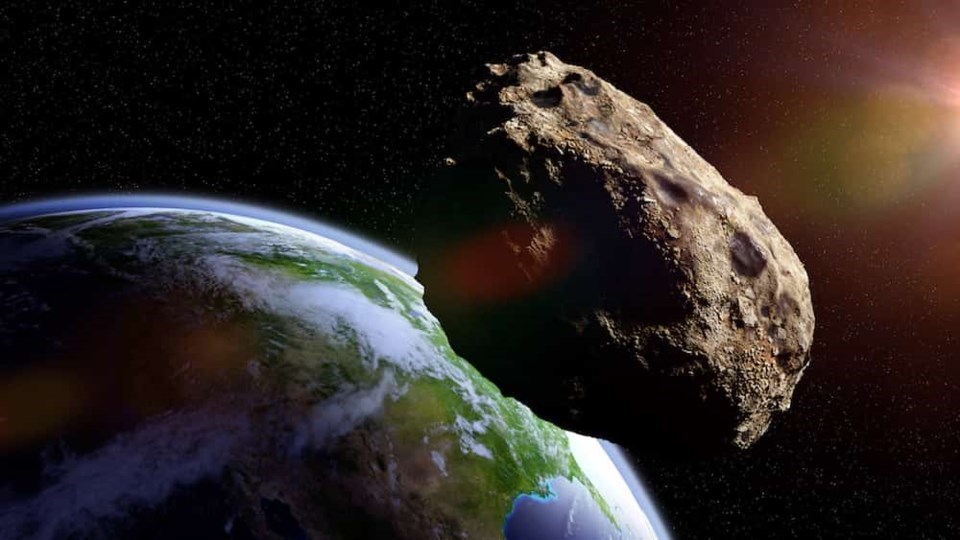Don't Look Up has a star-studded cast -- Leonardo Dicaprio, Jennifer Lawrence, and Cate Blanchett, to name a few -- but the movie capitalized on a terrifying, existential threat: a space rock capable of obliterating all life on Earth.
Right now, an asteroid with life-threatening potential is barrelling toward our planet, although it isn't expected to show up soon. But what impact, if any, will it have?
The Bennu Asteroid, discovered on Sept. 11, 2009, by the Lincoln Near-Earth Asteroid Research (LINEAR) survey, has the potential to inflict some serious damage on Earth if it makes contact.
Marley Leacock, an astronomer at the H.R. MacMillan Space Centre in Vancouver, says locals won't have to worry about the asteroid's impact on their lifetime but the next generation might have to worry. While it isn't likely to have an impact on Earth until Sept. 24, 2182, if it does, it has to potential to cause serious damage -- but the chances of that happening are pretty slim.
Still, the possibility was enough to spur NASA to launch a mission to the Empire State Building-sized space rock in 2020 to collect samples. The news is currently making headlines because the OSIRIS-REx spacecraft will return to Earth on Sunday, Sept. 24 with the interplanetary findings.
According to the Canadian Space Agency, Bennu is an "especially exciting target because it has remained mostly unchanged since the formation of the solar system, 4.6 billion years ago."
The space rock typically misses Earth, overlapping with its orbit every six years.
Is the Bennu Asteroid a 'planet killer'?
The term 'planet-killing' refers to an asteroid's size and NASA considers any space rock larger than 1 km to 2 km long to have global effects. While Bennu's impact could have far-reaching, potentially devastating effects, it doesn't possess the size required to cause a mass extinction.
Instead, Bennu meets the requirements of a "Potentially Hazardous Asteroid," meaning it is over 130 meters long, and the distance between the closest points of its orbit and Earth's orbit is less than 0.05 au.
"0.05 au is 5 [per cent] the distance between the Earth and the Sun, or something like 7.5 million km," Leacock clarifies.
Bennu is dangerous because of its size and because of how "close its orbit intersects with Earth's orbit."
For comparison, the moon is 384,400 km from Earth.
But the way it could impact Earth depends on a variety of factors.
"There are 157 possible Earth impacts, each with their own probabilities," she notes.
While the highest probability for the asteroid to make impact is on Sept. 24, 2182, there is a 99.963 per cent that the asteroid will miss Earth.
Where would Bennu make an impact? Will we be able to see it from Vancouver?
Bennu isn't big enough to destroy Earth but could cause potentially devastating damage to the "surrounding area where the impact occurs."
That said, it is difficult to say exactly what would happen if it did, Leacock explains.
"The energy released in the collision would be more than 20x the TNT equivalent of the Tsar Bomba, which is the most powerful nuclear weapon ever tested."
For now, earthlings don't have to worry about the asteroid's path. And if they want to watch it pass through the sky from Vancouver, they'll need adequate equipment, such as a "decently-sized telescope."
To view any celestial object, you'll need a relatively clear sky. To stay on top of upcoming Metro Vancouver weather, V.I.A.'s weather forecasting platform, Weatherhood, provides detailed, neighbourhood-specific forecasts for places across the Lower Mainland that include metrics like temperature, precipitation, air quality, humidity, and wind pressure.
For folks living in the City of Vancouver, they can browse specific forecasts for 14 different Weatherhood stations including UBC, Jericho, Downtown Vancouver, Dunbar, Kerrisdale, Mount Pleasant, Kitsilano, Granville Island, Yaletown, Stanley Park, False Creek, Strathcona, and Hastings Sunrise.
Stay up to date with NASA's findings from asteroid Bennu on the mission's page.



